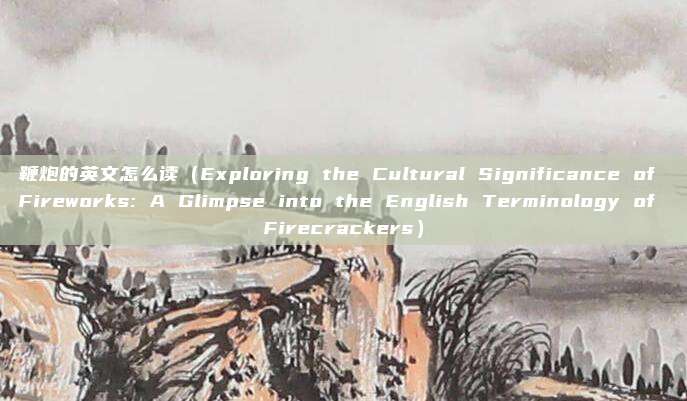鞭炮的英文怎么读(Exploring the Cultural Significance of Fireworks: A Glimpse into the English Terminology of Firecrackers)
温馨提示:这篇文章已超过301天没有更新,请注意相关的内容是否还可用!
Introduction:
Fireworks have long been a symbol of celebration and festivity across cultures. In many countries, they are synonymous with joyous occasions such as New Year's Eve, weddings, and festivals. While the visual and auditory spectacle of fireworks is universally admired, the terminology used to describe them varies from one language to another. This article delves into the English terminology for "firecrackers," exploring their cultural significance and the various ways they are referred to in English-speaking regions.
The English Terminology of Firecrackers:
In English, "firecrackers" are commonly used to refer to small, handheld explosives that produce a loud noise and an explosion when lit. However, there is a rich tapestry of other terms that describe different types of fireworks, each with its own unique characteristics and cultural connotations.

1、Firecracker:
The most general term for small, handheld explosives, "firecracker" is widely recognized and used in English-speaking countries. It is a straightforward term that encompasses all types of small, noisy fireworks.
2、Sparkler:
A "sparkler" is a long, slender stick filled with combustible material that emits sparks and a steady glow when lit. Sparklers are popular among children due to their safety and are often used during celebrations.
3、Fizzler:
"Fizzler" is a term used to describe a small, hand-held firework that emits a fizzing sound and produces a cloud of smoke when lit. It is a milder form of firecracker, often preferred by those who are sensitive to loud noises.
4、Popper:
A "popper" is a small, hand-held firework that emits a sharp, explosive sound when lit. It is often used in parties and celebrations to add a sense of excitement and surprise.
5、Chaser:
A "chaser" is a small, hand-held firework that is designed to be lit after another larger firework. It produces a series of small explosions, creating a continuous display of fireworks.
6、Crackler:
Similar to a fizzler, a "crackler" is a small, hand-held firework that emits a crackling sound and produces a cloud of smoke when lit. It is a quieter alternative to traditional firecrackers.
Cultural Significance of Firecrackers:
Firecrackers hold significant cultural importance in many English-speaking countries. Here are a few examples:
1、New Year's Eve:
In many English-speaking countries, fireworks are a staple of New Year's Eve celebrations. They symbolize the welcoming of the new year, the departure of the old, and the renewal of hope and prosperity.
2、Independence Day:
Fireworks are often used to celebrate Independence Day in countries like the United States, Canada, and Australia. They represent the freedom and independence that these nations have achieved throughout history.
3、Wedding Celebrations:
In some cultures, fireworks are used to mark the beginning of a new chapter in a couple's life. They symbolize the joy and excitement of the wedding celebration, as well as the couple's future together.
4、Festivals:
Fireworks are a common feature of many festivals, such as Guy Fawkes Night in the United Kingdom, where they are used to commemorate the failed Gunpowder Plot of 1605.
Conclusion:
The English terminology for "firecrackers" reflects the diverse range of fireworks available in English-speaking countries. From the general term "firecracker" to more specific terms like "sparkler," "popper," and "chaser," each type of firework has its own unique characteristics and cultural significance. Whether used to celebrate a festive occasion, mark a historical event, or simply bring joy and excitement, fireworks continue to be an integral part of many English-speaking cultures.
网站文章、图片来源于网络,以不营利的目的分享经验知识,版权归原作者所有。如有侵权请联系删除!





还没有评论,来说两句吧...